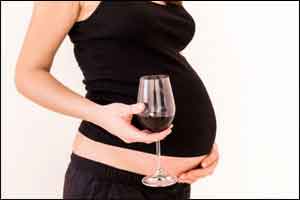- Home
- Editorial
- News
- Practice Guidelines
- Anesthesiology Guidelines
- Cancer Guidelines
- Cardiac Sciences Guidelines
- Critical Care Guidelines
- Dentistry Guidelines
- Dermatology Guidelines
- Diabetes and Endo Guidelines
- Diagnostics Guidelines
- ENT Guidelines
- Featured Practice Guidelines
- Gastroenterology Guidelines
- Geriatrics Guidelines
- Medicine Guidelines
- Nephrology Guidelines
- Neurosciences Guidelines
- Obs and Gynae Guidelines
- Ophthalmology Guidelines
- Orthopaedics Guidelines
- Paediatrics Guidelines
- Psychiatry Guidelines
- Pulmonology Guidelines
- Radiology Guidelines
- Surgery Guidelines
- Urology Guidelines
Light drinking upto two glasses of wine a week during pregnancy not harmful : BMJ

Doctors as a principle advise pregnant women to abstain from drinking. But a latest UK study has found that the evidence for potentially harmful effects of light or occasional drinking during pregnancy is "surprisingly limited".
The researchers from the University of Bristol looked for evidence of any complication during pregnancy like miscarriage, premature birth and smaller babies after women resorting to light drinking. The longer term effects like developmental delays, impaired intellect and behavioral problems were also studied.
They examined evidence from 26 studies that looked into the impact of drinking 2 units of alcohol which is equivalent to a standard 175ml glass of wine, a double shot of spirits or a pint of low-strength beer twice a week compared with total abstinence.
Their analysis, published in BMJ Open, shows that drinking up to 4 units of alcohol a week during pregnancy is, on average, associated with an 8% higher risk of giving birth to a small baby compared with drinking no alcohol at all. They also found limited evidence that this level of alcohol consumption is linked with a higher risk of premature birth. The conclusion of the researchers is that the evidence of the effects of drinking <32g/week in pregnancy is sparse
.“Despite the distinction between light drinking and abstinence being the point of most tension and confusion for health professionals and pregnant women, and contributing to inconsistent guidance and advice now and in the past, our extensive review shows that this specific question is not
being researched thoroughly enough, if at all," the authors write. "In addition, there has been no evidence regarding possible benefits of light alcohol consumption versus absence."
Experts remain uncertain exactly how much – if any – alcohol is completely safe in pregnancy. But following a recent review the UK's chief medical officers have said that it is safer not to drink while pregnant or trying to conceive.
Several experts have expressed their reaction to study and commented on the findings in statements published at science media centre.
Professor Russell Viner, officer for health promotion at the Royal College of Paediatrics and Child Health, comments: "There are lots of mixed messages when it comes to alcohol, but this research confirms that based on current evidence it is impossible to say what constitutes a 'safe' amount of alcohol a woman can drink if she’s trying for a baby and for women who are pregnant.My advice to women is that it’s best not to drink at all if you’re trying for a baby or pregnant. Regularly drinking even small amounts could be harmful and should be avoided, in line with the precautionary approach."
There are divergent views but most of experts agree on the following :
- The risk of harm to the baby is likely to be low if a woman has drunk only small amounts of alcohol before she knew she was pregnant or during pregnancy
- Women who find out they are pregnant after already having drunk during early pregnancy, should avoid further drinking, but should be aware that it is unlikely in most cases that their baby has been affected
- If patient is worried about how much she has been drinking when pregnant, talk to your doctor or midwife

Disclaimer: This site is primarily intended for healthcare professionals. Any content/information on this website does not replace the advice of medical and/or health professionals and should not be construed as medical/diagnostic advice/endorsement or prescription. Use of this site is subject to our terms of use, privacy policy, advertisement policy. © 2020 Minerva Medical Treatment Pvt Ltd